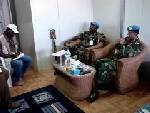By Louise Arbour
United Nations High Commissioner for Human Rights
The plight of victims of sexual attacks during conflict has come to the fore once again when last week, the International Criminal Court’s Prosecutor requested summons for two Sudanese connected with atrocities in Darfur. According to the Prosecutor, there is strong evidence pointing to the suspects’ responsibility for mass rape and other war crimes. Previously, the ICC had issued an arrest warrant for the leader of the Lord Resistance Army, a rebel group in Uganda, on the ground of war crimes, including ordering sexual enslavement and rape.
Thus, ICC action is gearing up to bolster the cumulative experience of international justice mechanisms that have brought to light specific types and patterns of sexual crimes targeting mainly women and girls in war torn zones, as well as identified individual responsibilities in their commission. The work of these courts has also highlighted the difficulties in prosecuting perpetrators and countering the culture of impunity that shields their criminal acts. Such impunity, of course, permeates all societies, be they peaceful or at war. Not by coincidence, this year International Women Day is dedicated to combating this pervasive lack of accountability. It is, however, in times of war that the effects and consequences of impunity are at their starkest. This is due both to the widespread, systematic and often sustained nature of sexual attacks and to the number and callousness of perpetrators.
Although at their most brutal in war, sexual abuses against women often stem from longstanding prejudices, a lack of equality and discrimination that had condoned such violence all along. When perpetrators go unpunished, they are emboldened to strike again, perpetuating and encouraging vicious cycles of attack and reprisal even when a country emerges from conflict. Rendering justice to the victims is, therefore, not only a moral imperative, but also a precondition for reconciliation and peace to take hold.
Yet, sexual violence has been traditionally underreported and under-prosecuted. As a result, such crimes have long been considered as regrettable but unavoidable byproducts of armed confrontation. Women as victims or pawns of belligerents could demand no recourse.
Only recently has this powerlessness been addressed, primarily by the groundbreaking work of the International Criminal Tribunals for the former Yugoslavia and Rwanda. The tribunals defined systematic violence against women as crimes for which those responsible could be held accountable, thereby empowering victims to have their day in court. The creation of the International Criminal Court gave an additional boost to such emerging jurisprudence and changing mind set. Its statute stipulates that rape, sexual slavery, enforced sterilization, or any other forms of sexual violence of comparable gravity are considered as war crimes. If these acts are committed as part of widespread or systematic attacks on a civilian population, they constitute crimes against humanity.
It now remains to be seen whether governments will accede to the Court’s requests and surrender the suspects for trial. But if government non-compliance is potentially the main obstacle to the course of international justice, there are other factors that hamper prosecution. Victims of all forms of violence are often reluctant to come forward, in large part because they have little confidence that justice will be done. Although some of the perpetrators may have been apprehended, others, as well as their accomplices, may remain at large and therefore capable of inflicting further harm to victims, witnesses and their families.
The Special Court for Sierra Leone has made strides in addressing such hindrances in the face of a monumental task: as the result of ten years of conflict and the belligerents’ methods of warfare in that country, the brutality of sexual violence was extraordinary, and its victims were to be counted in the thousands. The Court benefited from its proximity to the victims, the parallel work of a Truth and Reconciliation Commission and a framework that protected the victims and ensured that their dignity was preserved. The ICC, too, is building on previous experiences and strengthening legal assistance and protection for victims.
Although the mandate and machinery of international courts have become increasingly more sophisticated and far-reaching over the years, gender justice continues to remain the exception rather than the rule. Successfully prosecuted cases represent just the tip of the iceberg. The crux of the matter in combating impunity is the requisite political will to tackle it. Often slow to gear up into motion, such political will needs to be mobilized through domestic and international pressure as well as continuous scrutiny.
Wednesday, March 7, 2007
Subscribe to:
Post Comments (Atom)



No comments:
Post a Comment